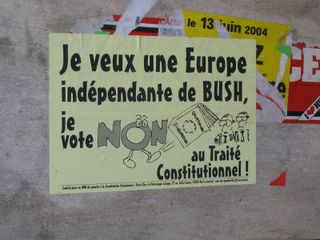The European "Constitution" as American Plot

"I want a Europe independent of Bush, I vote 'no' to the Constitutional Treaty",
Paris, March 2005
In fact, a large part of the "leftist" opposition in France to the EU's proposed "constitutional treaty" (the sponsor of the above sticker calls itself the "Committee for a Leftist 'No' to the European Constitution") - and some of the "rightist" opposition (see Philippe de Villiers) - has known of no better argument against the treaty/"constitution" than to say that it is too "American". To the degree that this charge is ever fleshed out, it typically makes allusion to one of two aspects of the treaty. The first is the treaty's alleged "neo-liberal" inspiration, i.e. inasmuch as "neo-liberalism" in this style of discourse is essentially reduced to the connotation of free trade and free trade is supposed to be either the cardinal sin of "the American way of life" or the secret weapon for establishing American hegemony or (confusedly) both. The claim that the treaty is "neo-liberal" in inspiration rests on a myth. The European Union has never constituted a free trade area and there is nothing in the "constitutional treaty" that will make it be one in the future. The EU involves rather a customs union and customs unions are by their very nature protectionist, i.e. with respect to third parties - as, for example, in the present case, the United States. So: no "secret weapon". The difference between a free trade area and a customs union and the relevance of the distinction to understanding the EU are discussed in this excellent post by Richard North on the EU Referendum blog. It would be more accurate to say that the EU project is moved by a decidedly il-liberal, namely “Listian”, inspiration – in honor of the 19th Century German economist Friedrich List, theorist of the German Customs Union or “Zollverein” of 1834.
It is true that on the internal market, per Article 1-3, §2 of the “constitutional treaty”, competition is supposed to be “free and undistorted”. “Leftist” opponents of the treaty never tire of citing this phrase and with evident horror. But, firstly: would they prefer a market characterized by constrained and distorted competition? And, secondly, if they would, their wishes might well be fulfilled – or rather, given the dubious record of the European institutions thus far on safeguarding competitive conditions, might continue to be so. Article 1-3, §2 forms part of what is essentially a laundry list of pious declarations without any obvious legal effect. Indeed, the relevant part of Article 1-3, §2 reads “The Union shall offer its citizens...an internal market where competition is free and undistorted”, employing a constative formula that suggests that the Union “provides its citizens” the indicated “value-added” no matter what in practice the European institutions do or do not do. The ostensible “commitment” to “free and undistorted” competition will no more prevent the European institutions from constraining competition or creating or tolerating conditions of distorted competition than the ostensible “commitment” to world peace contained in Article 1-3, §1 and §4 (“In its relations with the wider world, the Union...shall contribute to peace”) will prevent European armed forces from going to war.
This brings me to the second element of the “constitutional treaty” that its would-be anti-American detractors tend to cite: namely, the provisions on a common security and defense policy and, in particular, Article 1-41, §2, the relevant part of which (reproduced from the Treaty of Amsterdam) reads as follows:
The policy of the Union in accordance with this Article shall not prejudice the specific character of the security and defence policy of certain Member States, it shall respect the obligations of certain Member States, which see their common defence realised in the North Atlantic Treaty Organisation, under the North Atlantic Treaty, and be compatible with the common security and defence policy established within that framework.
In short, for the “antis”, the provisions on the common security and defense policy are supposed to be too “American” merely to the degree that they permit NATO members -somewhat begrudgingly, it would seem - to fulfill their obligations under the North Atlantic Treaty. Incidentally, the conflicted tone of the concession is even clearer in the French version of this passage, which speaks of “certain states” that “consider that [my emphasis – JR] their common defense is realized within the framework of NATO” – a formulation that in the given context seems to imply that the certain states in question might well be wrong in their assessment.
The allegation that the proposed EU “constitutional treaty” is too “American” is so obviously preposterous that one is left wondering if it does not in fact form part of a clever campaign to encourage a “yes” vote.


<< Home